As anger over incoming tax hikes boils over in Kenya, African Stream takes a deep dive into the role the International Monetary Fund (IMF) has played in ramming austerity down Africans’ throats. It boils down to neocolonial debt slavery, a system designed to oppress Africans, while oiling the wheels of otherwise faltering Western economies. African Stream’s Kenneth Kaigua breaks down this complex issue.
Related Articles
Related Articles
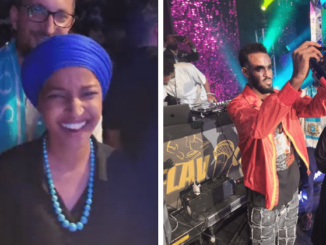
Ilhan Omar’s Meddling in Horn of Africa Earns Boos at Somali Concert
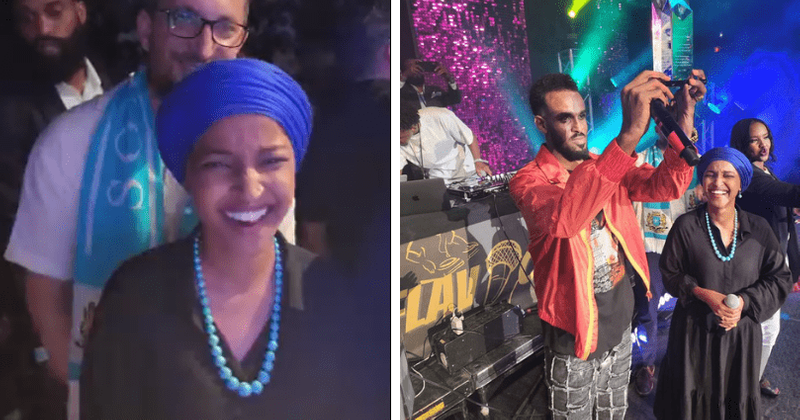
Editor’s Note: This article was originally published by The Grayzone.
Ilhan Omar was greeted with vigorous booing during a July 2 Minneapolis concert featuring Somali singer Suldaan Seeraar in Minneapolis. The booing was so profound and so sustained that it was impossible to mistake it for cheering, or all the thumbs down for thumbs up. It reportedly went on for ten minutes or more, punctuated with, “Get out!” and “Get the f*ck out of here!”
Ilhan smiled, gesturing at the crowd to tamp it down, as though the adulation was just too much. Her husband, Tim Mynett, stood at her side looking awkward and confused, then someone who seemed to be a concert manager gestured at the crowd more emphatically to tamp it down. Some say the booing went on even longer while Ilhan went through the process of presenting Suldaan Seeraar with some sort of award.
The singer shifted uneasily from one leg to another, seeming startled and unsure what to do, then reached out to gesture at the crowd, also asking them to tone down their gestures of disapproval. This seemed to be more than he had bargained for when he agreed to share the stage with the congresswoman.
Congresswoman Ilhan Omar was booed last night by thousands of the Minneapolis Somali community last night at a Somalia Independence Day celebration concert.
“Go home! Go home!” pic.twitter.com/40TPX4M4NA
— Rebecca Brannon (@RebsBrannon) July 3, 2022
Seeraar is extremely popular in the Somali community and was playing to a packed house; he’s unaccustomed to boos. This was his first concert in North America and he’s likely unfamiliar with Ilhan’s record in the House and on the House Foreign Affairs Committee’s Subcommittee on Africa, Global Health, and Global Human Rights, where she serves as vice chair. (Karen Bass currently chairs the subcommittee, and vice chairs the National Endowment for Democracy, the regime change wing of the U.S. government, and is all but certain to become the next mayor of Los Angeles come November.)
Ilhan, an African immigrant and the only Black person on the subcommittee besides Bass, is a shoe-in to become chair if Democrats hold onto the house, unlikely as that may seem.
Many Africans shudder at the thought, however –– not only in Somalia, her country of origin, and the rest of the Horn of Africa, but also in the African Great Lakes Region and in diasporas from both regions.
When I organized a Twitter space discussion with Somali American activists on Ilhan’s record, I heard an outpouring of anger not only over her perceived neglect of her district, where violent crime is surging, but also over her role in the removal of Somali President Mohamed Abdullahi Mohamed and her support for a candidate affiliated with her personal clan. This was but one of examples of the congresswoman’s role in advancing U.S. meddling in the Horn of Africa.
Ilhan Omar Meets with Kagame and Tedros As They Plot Against Ethiopia
In October 2021, Ilhan traveled to Rwanda as a guest of its authoritarian president and war criminal Paul Kagame, a darling of global elites. She then proceeded to vote against a House resolution to call on Kagame to free political prisoner Paul Rusesabagina.
In Rwanda on a private visit, Congresswoman Mrs @IlhanMN stopped by our offices today, for a presentation of the Foundation and other programmes, initiated by Our Chairperson @FirstLadyRwanda. pic.twitter.com/HNQBffJDy1
— Imbuto Foundation (@Imbuto) October 9, 2021
David Himbara, a former economic advisor to Kagame, and Tom Zoellner, author of Rusesabagina’s biography, slammed Ilhan in a Minnesota Post op-ed, writing that her relationship with Kagame threatened “to throw her entire stance on the U.S. criminal justice system into a light of hypocrisy.”
With regard to the Ethiopian civil conflict, Ilhan has directed her criticism squarely at the government, even as it defends Ethiopia from attack by the U.S.-backed Tigrayan People’s Liberation Front (TPLF), which ruled the country brutally for 27 years, from 1991 to 2018, and waged war against Eritrea.
On April 7 of this year, the congresswoman met with former TPLF Foreign Minister Tedros Adhanom Ghebreyesus to “discuss global health security challenges, including the status of the global COVID response, the global hunger crisis, and ways to improve digital technology to broaden healthcare access.”
Yesterday, we met with @DrTedros to discuss global health security challenges, including the status of the global COVID response, the global hunger crisis, and ways to improve digital technology to broaden healthcare access. pic.twitter.com/VfifvVrcSL
— Rep. Ilhan Omar (@Ilhan) April 7, 2022
Tedros has relentlessly abused his global platform as Director of the World Health Organization, in violation of UN rules about political neutrality, to advocate for Tigray — home of the TPLF — as though it were the only Ethiopian region suffering the consequences of the war. He never mentions the immeasurable suffering caused by TPLF invasions of Amhara and Afar Regions, both of which I traveled through in April and May.
After Ilhan’s meeting with Dr. Tedros, members of the Ethiopian community unsuccessfully demanded that they release the minutes of the meeting.
On several occasions, Ilhan has asked the State Department for “legal determinations” as to whether the Ethiopian government is guilty of atrocities. Meaning, in fact, illegal determinations, because the assumption she has advanced is that the U.S. has the right to rule that international crimes — most of all genocide, war crimes, and crimes against humanity — have been committed and action must be taken, as in Libya and Syria. According to international law codified in the UN Charter, only the UN Security Council can do that.
On December 21, 2021, while questioning Assistant Secretary of State for African Affairs Molly Phee, Ilhan requested an illegal “legal determination” regarding Ethiopian atrocities, called for an arms embargo on Ethiopia, which would make it unable to defend itself, and proposed a “carrot and stick approach” to bringing Somalia to heel.
Ilhan Omar Backs Cold War-Style Measure to Bully African Nations Into Submission
On April 27, Ilhan voted to pass H.R. 7311 – Countering Malign Russian Activities in Africa Act, along with all the rest of the House Democrats and all but nine Republicans. H.R. 7311 directs the executive branch to bully African nations with sanctions and withdrawal of foreign aid if they get too close to Russia, and to “invest in, engage, or otherwise control strategic sectors in Africa, such as mining and other forms of natural resource exploitation.”
The House passed H.R. 7311 roughly two months after 17 African countries either voted to abstain or did not vote on a UN resolution condemning Russia for invading Ukraine, and Eritrea dared to vote no. The African states voting no comprised just over half of the 35 UN member nations that opposed the measure.
House Resolution 6600, a harshly punitive bill that would sanction Ethiopia and Eritrea, is now pending in the House Foreign Relations Committee. According to Ilhan’s constituents, she has not spoken out against it, although she did make a splash by voting against the embargo on Russian oil.
Why Was Ilhan Omar Booed at Suldaan Seeraar’s Minneapolis Concert?
This writer joined a July 6 Twitter space opened by Somali American community organizer Abdirahman Warsame; 294 Somali Americans and a few Somalis — despite the distant time zone — joined the space. Many of the Somali Americans participating were from Ilhan’s Minneapolis district, and some of the younger ones had attended the concert.
Abdirahman told me that activists with the #NoMore Global Movement for Solidarity in the Horn of Africa had planned to get a few front row seats at the Suldaan Seeraar concert to boo Ilhan and that once they started, it was like a match in a haystack.
Everyone in the Twitter space was furious because Ilhan did her best to help the U.S. displace President Mohamed Abdullahi Mohamed, aka Farmaajo, whom they described as a decent, responsible, corruption-fighting anti-imperialist.
Farmaajo had joined Ethiopian Prime Minister Abiy Ahmed and Eritrean President Isaias Afwerki in signing the Joint Declaration on Comprehensive Cooperation Between Ethiopia, Eritrea and Somalia, which ended the long-running war between Ethiopia and Eritrea, and promised a new day of regional cooperation between the three largest nations in the Horn of Africa. It said:
“Considering that the peoples of Ethiopia, Somalia and Eritrea share close ties of geography, history, culture and religion as well as common interests, the three countries shall build close political, economic, social, cultural and security ties. The three governments hereby establish a Joint High-Level Committee to coordinate their efforts in the framework of this Joint Declaration.”
That, however, was more peace and independence than the U.S. government could tolerate, as many on the Twitter space angrily confirmed. Now, with Farmaajo out of office, the alliance is considerably weakened. The peace between Ethiopia and Eritrea still stands, although the U.S.-backed TPLF keeps skirmishing with its troops on their common border, and Eritrea is helping Ethiopia in its civil war with the TPLF in Welkait.
Ilhan put an enormous effort into getting rid of Farmaajo in a parliamentary election, which many in this Twitter space said was actually clan-based and manipulated by bribery.
Last year, on December, she quote-tweeted a State Department threat to take action if Somalia did not hold elections immediately, stating: “Farmaajo is a year past his mandate. It’s time for him to step aside, and for long overdue elections to proceed as soon as possible.” Her comment was widely republished to make the case against Farmaajo in the U.S. press.
Farmaajo is a year past his mandate. It's time for him to step aside, and for long overdue elections to proceed as soon as possible. https://t.co/f08bSjOJrm
— Ilhan Omar (@IlhanMN) December 27, 2021
Both the president and the parliament were at that time in office past their constitutional terms. That made Farmaajo interim president, but the states of Puntland and Jubaland refused to recognize his authority. Elections had been repeatedly planned but postponed due to disagreements between parties and lack of election infrastructure. In addition, the Islamist Al-Shabaab was continuing to oppose the existence of a secular Somali state, and the U.S. was still bombing on occasion.
According to those in the Twitter space, Farmaajo had been fighting to establish a direct, one-person-one-vote electoral process to replace the corrupt system of parliamentary election. They said he would have won in a landslide had he succeeded.
As soon as Farmaajo was defeated on May 15 — even before the formal transfer of power — Biden announced a plan to reintroduce troops to Somalia. The New York Times reported the news without raising an eyebrow, but the fury expressed in the 194 reader comments was palpable.
Most commenters were Americans outraged that the U.S. would be introducing more troops anywhere after the Afghanistan debacle, but they also included this response by a Somali American (edited very slightly for punctuation and grammar):
Shakur Abdull
Columbus, OH May 17
Somalia’s federal government just re-elected former president Hassan Sheikh Mohamud less than 48 hrs ago.
The former president Mohamed Abdullahi Farmaajo, who was previously a U.S. citizen and resident of Buffalo, NY, has lost the election due to parliamentary bribery, corruption, and foreign nations’ interfering, spending millions of dollars to overthrow Farmaajo. Those nations included Kenya, U.A.E., & others.
It’s not surprising news to witness the Biden administration seeking to have U.S. military presence in Somalia, since Hassan Sheikh’s election because President Farmaajo would’ve opposed it. Furthermore, this move will only increase security risks and destabilize the Horn of Africa. Sending U.S. military troops now to Somalia is unnecessary, and those troops will be viewed as enemies to the nation and its serenity.
The Somalia army has been fighting Al-Shabaab and all terrorist activities within the region. The army are well trained by the U.S., Turkey, Eritrea, and so on, but the Somalia government is faced with an arms embargo which limits its abilities and its operations. If President Biden wanted to offer solutions or a hand, then the approach would’ve been totally different than resending American troops back into a hostile situation. Former U.S. President Trump’s hands-off position in foreign affairs was exceptionally appreciated.
Also as soon as Farmaajo was gone, and even before the formal transition of power, an oil and gas extraction contract with a U.S. corporation that Farmaajo had blocked was back in play.
The July 6 Twitter space on the booing of Ilhan Omar contained similarly angry commentary by Somali Americans about her imperialist foreign policy positions. After the discussion, several participants sent over the following pointed statements:
Deeqa, @Deeqa_lulu
I am a Somali woman and I think I would have obtained my rights and my future would have been better in Somalia if I had the opportunity to vote for President Farmaajo, but we didn’t have the one-person-one-vote system that he was trying to put in place. Ilhan Omar is originally from Somalia and she has a daughter my age who can vote for her own president in America. She says she believes in democratic principles and she’s a member of the Democratic Party, but she didn’t support a very important right for me, the right to vote in a one-person-one-vote election.
Is this about the Democratic Party or about U.S. foreign policy toward Somalia? Either way, I feel bad and frustrated that she hasn’t changed that. Why would I expect Joe Biden to understand my problem if Ilhan Omar doesn’t? I contacted my family in America and told them not to give their votes to the Democratic Party or to Ilhan. Our 2022 election here in Somalia was eye opener for us about the Democratic Party policy toward Somalia.
We want to vote here in Somalia. That’s one of my biggest dreams now. –Deeqa
Mohammed Caanogeel, @MCaanogeel1
Ilhan Omar is being used by the Democratic Party, whose foreign policy has been aggressive and counterproductive towards Somalia.
She got booed at the concert for two reasons:
Domestically, she promised the East African community help with gun violence and drugs in our community and she hasn’t helped us with that at all.
Internationally, she undermined our sitting Somali president, President Farmaajo, by tweeting and making speeches that he was no longer the president of Somalia even though the constitution of Somalia gave him legitimacy to continue until another president took over. She was helping the U.S. government undermine this president who had captured the hearts and minds of all Somali people.
Farmaajo enjoyed 90% popularity for good governance. This president introduced reforms into the economy to win debt relief from the IMF and World Bank, but Ilhan voted against debt relief here in the United States.
Farmaajo asked the U.S. to lift the arms embargo so that our army could fight the Al-Shabaab fundamentalists, but Ilhan refused to vote for that.
President Farmaajo was loved for his stability, transparency, and fairness. He made us proud by building the military and making our intelligence one of the top 10 in Africa. He built institutions back after 30 years of war, invited foreign embassies into Somalia, and established embassies abroad.
He became such a role model president that the Somali people bought him a home, library, and offices for future campaigns. Even poor people loved Farmaajo so much that they gave to this fund drive for him.
Ilhan joined U.S. policymakers in rejecting all his good deeds, rejecting what the Somali people wanted, rejecting one-man-one-vote, and instead threatened to cut off aid. She and the rest of the U.S. government seek only the worst for Somalia. As we write to each other, the U.S. military has overtaken Berbera Airport and brought a warship to Berbera shores. -Mohammed Caanogeel
Ilhan Ignores the Boos in a Safe Blue District
After the booing episode, Fox gleefully hosted Ilhan Omar’s Republican challenger Cecily Davis to mouth meaningless platitudes about how her opponent is “out of touch with her constituents,” claiming “they are ready for change and are seeking someone who represents their conservative values.”
Davis appeared to be completely ignorant about why an audience of Somali Americans might boo their Somali American representative. The same was true of other right-wing outlets who framed the booing as confirmation that Ilhan’s woke identity offends her own community and that their candidate was therefore a serious contender.
Shukri Abdirahman, a conservative Republican who previously ran to unseat Ilhan, also highlighted the congresswoman’s “woke” positions on social issues as a source of local resentment, but also made sure to point to Ilhan “becoming an election-meddling dictator in the foreign affairs of Somalia – a sovereign nation.”
🧵 Understanding The Booing
Ilhan Omar getting booed and being told to get the f*ck out by our Somali community is not just a revolt against Ilhan selling her soul to the devil and becoming an election-meddling dictator in the foreign affairs of Somalia – a sovereign nation. 1/3
— Shukri Abdirahman (@ShuForCongress) July 5, 2022
Abdirahman Warsame (no relation to Shukri) told me that some culturally conservative Somalis had told him they were uncomfortable with Ilhan’s defense of abortion and LGBT rights, but no one expressed that discomfort in the Twitter space.
Minnesota’s 5th District is the bluest in the state, so the incumbent merely has to win the August primary to win the election, and she is expected to, though perhaps not by the margin she’d like. However, the House is all but certainly turning red, so the next chair and vice chair of the House Foreign Relations Subcommittee will in all likelihood be someone other than Ilhan Omar.
Ann Garrison is a Black Agenda Report Contributing Editor based in the San Francisco Bay Area. In 2014, she received the Victoire Ingabire Umuhoza Democracy and Peace Prize for promoting peace through her reporting on conflict in the African Great Lakes Region. She can be reached on Twitter @AnnGarrison and at ann(at)anngarrison(dot)com.
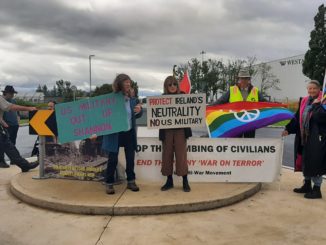
The Roar of a U.S. Warplane Over a Civilian Irish Airport
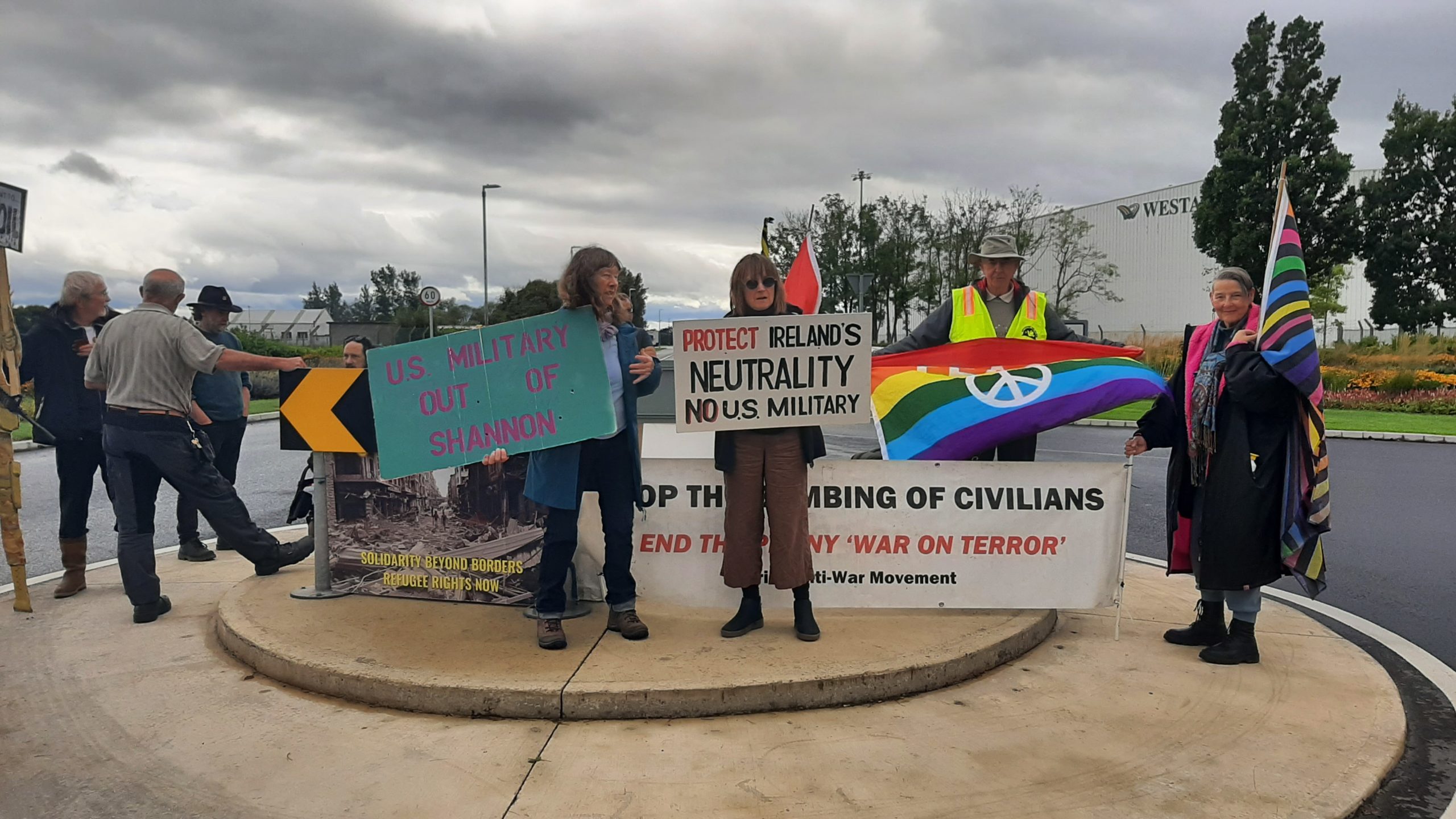
Editor’s Note: This article was produced by Globetrotter.
“This is not a regular airport,” Margaretta D’Arcy said to me as we heard a C-130T Hercules prepare to take off from Shannon Airport in Ireland after 3 p.m. on September 11, 2022. That enormous U.S. Navy aircraft (registration number 16-4762) had flown in from Sigonella, a U.S. Naval Air Station in Italy. A few minutes earlier, a U.S. Navy C-40A (registration number 16-6696) left Shannon for the U.S. military base at Stuttgart, Germany, after flying in from Naval Air Station Oceana in Virginia. Shannon is not a regular airport, D’Arcy said, because while it is merely a civilian airport, it allows frequent U.S. military planes to fly in and out of it, with Gate 42 of the airport functioning as its “forward operating base.”
At the age of 88, D’Arcy, who is a legendary Irish actress and documentary filmmaker, is a regular member of Shannonwatch, comprising a group of activists who have—since 2008—held monthly vigils at a roundabout near the airport. Shannonwatch’s objectives are to “end U.S. military use of Shannon Airport, to stop rendition flights through the airport, and to obtain accountability for both from the relevant Irish authorities and political leaders.” Edward Horgan, a veteran of the Irish military who had been on peacekeeping missions to Cyprus and Palestine, told me that this vigil is vital. “It’s important that we come here every month,” he said, “because without this there is no visible opposition” to the footprint of the U.S. military in Ireland.
According to a report from Shannonwatch titled “Shannon Airport and 21st Century War,” the use of the airport as a U.S. forward operating base began in 2002-2003, and this transformation “was, and still is, deeply offensive to the majority of Irish people.”
Article 29 of the Irish Constitution of 1937 sets in place the framework for the country’s neutrality. Allowing a foreign military to use Irish soil violates Article 2 of the Hague Convention of 1907, to which Ireland is a signatory. Nonetheless, said John Lannon of Shannonwatch, the Irish government has allowed almost 3 million U.S. troops to pass through Shannon Airport since 2002 and has even assigned a permanent staff officer to the airport. “Irish airspace and Shannon Airport became the virtual property of the U.S. war machine,” said Niall Farrell of Galway Alliance Against War. “Irish neutrality was truly dead.”
Pitstop of Death
Margaretta D’Arcy’s eyes gleam as she recounts her time at the Greenham Common Women’s Peace Camp, located in Berkshire, England, and involving activists from Wales, who set up to prevent the storage and passage of U.S. cruise missiles at this British military base. That camp began in 1981 and lasted until 2000. D’Arcy went to jail three times during this struggle (out of a total of at least 20 times she was in prison for her antiwar activism). “It was good,” she told me, “because we got rid of the weapons and the land was restored to the people. It took 19 years. Women consistently fought until we got what we wanted.” When D’Arcy was arrested, the prison authorities stripped her to search her. She refused to put her clothes back on and went on both a hunger strike and a naked protest. In doing so, she forced the prison authorities to stop the practice of performing strip searches. “If you act with dignity, then you force them to treat you with dignity,” she said.
Part of this act of dignity includes refusing to allow her country’s airport to be used as part of the U.S. wars in Afghanistan and Iraq. Since 2002, several brave people have entered the airport and have attempted to deface U.S. aircraft. On September 5, 2002, Eoin Dubsky painted “No way” on a U.S. warplane (for which he was fined); and then on January 29, 2003, Mary Kelly took an axe onto the runway and hit a military plane, causing $1.5 million in damage; she was also fined. A few weeks later, on February 3, 2003, the Pitstop Ploughshares (a group of five activists who belonged to the Catholic Worker Movement) attacked a U.S. Navy C-40 aircraft—the same one that Mary Kelly had previously damaged—with hammers and a pickaxe (a story recounted vividly by Harry Browne in Hammered by the Irish, 2008). They also spray-painted “Pitstop of Death” on a hangar.
In 2012, Margaretta D’Arcy and Niall Farrell marched onto the runway to protest the airport being used by U.S. planes. Arrested and convicted, they nonetheless returned to the runway the next year in orange jumpsuits. During the court proceedings in June 2014, D’Arcy grilled the airport authorities about why they had not arrested the pilot of an armed U.S. Hercules plane that had arrived at Shannon Airport four days after their arrest on the runway. She asked, “Are there two sets of rules—one for people like us trying to stop the bombing and one for the bombers?” Shannon Airport’s inspector Pat O’Neill replied, “I don’t understand the question.”
“This is a civilian airport,” D’Arcy told me as she gestured toward the runway. “How does a government allow the military to use a civilian airport?”
Extraordinary Renditions
The U.S. government began illegally transporting prisoners from Afghanistan and other places to its prison in the Guantánamo Bay detention camp and to other “black sites” in Europe, North Africa, and West Asia. This act of transporting the prisoners came to be known as “extraordinary rendition.” In 2005, when Dermot Ahern, Ireland’s minister for foreign affairs, was asked about the “extraordinary rendition” flights into Shannon Airport, he said, “If anyone has any evidence of any of these flights, please give me a call and I will have it immediately investigated.” Amnesty International replied that it had direct evidence that up to six CIA chartered planes had used Shannon Airport approximately 50 times. Four years later, Amnesty International produced a thorough report that showed that their earlier number was deflated and that likely hundreds of such U.S. military flights had flown in and out of the airport.
While the Irish government over the years has said that it opposes this practice, the Irish police (the Garda Síochána) have not boarded these flights to inspect them. As a signatory of the European Convention on Human Rights (signed in 1953) and the United Nations Convention Against Torture and Other Cruel, Inhuman or Degrading Treatment or Punishment (adopted in 1984 and ratified in 1987), Ireland is duty-bound to prevent collaboration with “extraordinary rendition,” a position taken by the Irish Council for Civil Liberties. In 2014, Irish parliamentarians Mick Wallace and Clare Daly were arrested at Shannon Airport for trying to search two U.S. aircraft that they believed were carrying “troops and armaments.” They were frustrated by the Irish government’s false assurances. “How do they know? Did they search the planes? Of course not,” Wallace and Daly said.
Meanwhile, according to the Shannonwatch report, “Rather than take measures to identify past involvement in rendition or to prevent further complicity, successive Irish [g]overnments have simply denied any possibility that Irish airports or airspace were used by U.S. rendition planes.”
In 2006, Conor Cregan rode his bicycle near Shannon Airport. Airport police inspector Lillian O’Shea, who recognized him from protests, confronted him, but Cregan rode off. He was eventually arrested. At Cregan’s trial, O’Shea admitted that the police had been told to stop and harass the activists at the airport. Zoe Lawlor of Shannonwatch told me this story and then said, “harassment such as this reinforces the importance of our protest.”
In 2003 and 2015, Sinn Féin—the largest opposition party in the Northern Ireland Assembly—put forward a Neutrality Bill to enshrine the concept of neutrality into the Irish Constitution. The government, said Seán Crowe of Sinn Féin, has “sold Irish neutrality piece by piece against the wishes of the people.” If the idea of neutrality is adopted by the Irish people, it will be because of the sacrifices of people such as Margaretta D’Arcy, Niall Farrell, and Mary Kelly.
Vijay Prashad is an Indian historian, editor and journalist. He is a writing fellow and chief correspondent at Globetrotter. He is an editor of LeftWord Books and the director of Tricontinental: Institute for Social Research. He is a senior non-resident fellow at Chongyang Institute for Financial Studies, Renmin University of China. He has written more than 20 books, including The Darker Nations and The Poorer Nations. His latest books are Struggle Makes Us Human: Learning from Movements for Socialism and (with Noam Chomsky) The Withdrawal: Iraq, Libya, Afghanistan, and the Fragility of U.S. Power.
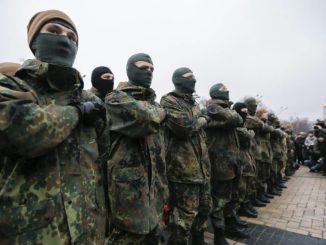
Ukraine: The Tip of the Spear for the Imperialist Project
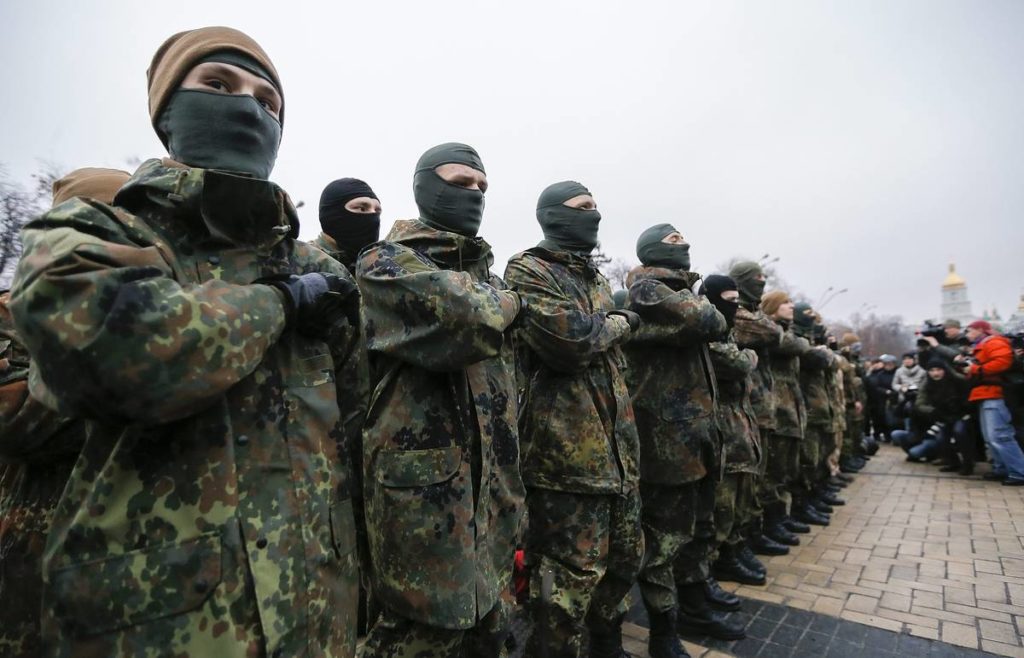
Editor’s Note: This is based on a presentation the author gave during a February 6 webinar, “U.S./NATO Aggression at the Russian Border. No War with Russia.” The event was a conversation between Russian, Ukrainian and U.S. activists the United National Antiwar Coalition had organized.
We have serious concerns that the accelerated drive to militarization and war by the United States and its allies dramatically unfolding with the crisis in Ukraine might very easily escalate to the point that it could threaten global humanity.
In their mad drive to advance their geostrategic interests to the detriment of everyone else—the Democratic Party version of “America First”—the Biden administration willfully violates all of the core principles of international relations and law. The respect for national sovereignty, the prohibition against threatening other members of the United Nations with military actions, non-intervention and adherence to international law are not recognized by the United States, which sees itself as an exception to the rule of law.
The manufactured crisis in Ukraine is just the latest episode of the reckless and delusional drama that the United States is involved in to attempt to maintain hegemony in conditions that have fundamentally changed. That is why contextualizing Ukraine as another example of why a global anti-war and anti-imperialist movement is so vitally important.
As long as the commitment to “Full Spectrum Dominance” remains bipartisan policy, today, it’s Ukraine. But tomorrow, it is certain to be another nation, another issue that will require a response from the peoples of the world.
As stated in the final declaration of the Fourth Canada-United States-Mexico Trilateral Peace Conference in Moca, Dominican Republic, held in September 2018, there must be a firm and principled commitment on the part of peace and anti-imperialist organizations that “peace must be based on the principles of non-intervention and full respect for the sovereignty, territorial integrity, self-determination and independence of all states, as stipulated in the United Nations Charter and covenants of international law enacted since the end of the second imperialist war known as World War II.”
Yet, the web of global U.S. command structures—with over eight hundred military bases—NATO as the largest military alliance in the world; illegal, draconian sanctions; and political subversion through coups makes national sovereignty impossible. The illegal and unilateral actions by the United States and its allies represents a constant threat to international peace and perpetuates a lawless, international Hobbesian state of nature.
So, while it is quite clear how we got to this moment with the situation in Ukraine, the challenge for the anti-war, pro-peace movement—and more specifically for the anti-imperialist organizations and movements in the United States and Europe—is to ground our understanding of the driving force and objective interests responsible for where the international community is at this moment.
For the Black Alliance for Peace (BAP) the common enemy is the U.S./EU/NATO Axis of Domination. We argue that we must center our analysis within the context of the global class struggle—a struggle sharpened by the ongoing and irreconcilable contradictions of the global colonial-capitalist system.
That is important because if we do not identify the real, concrete material forces, we can find ourselves struggling against shadows, instead of against the corporeal reality of an alliance of states dedicated to advancing their interests to the detriment of everyone else.
It is imperialism, led by the United States, that is the culprit. Its parasitic imperialist domination would be impossible without its core instrument of enforcement and control: State violence. That is why we are discussing Ukraine today.
Imperialism: That is framework. Today, it is Ukraine. Tomorrow, it might be China. Why? Because with the seemingly sudden and spontaneous crisis that emerged with Ukraine, the steady, violent, oppressive and repressive relations of power between the United States and Western capital and the rest of humanity continues. Objective reality bears this out. While we are focused on Ukraine as the most immediate danger, the people of Afghanistan are starving, bombs are still dropping in Yemen, coups are unfolding in Africa, the United States is still pivoting to Asia, and the peoples and nations of Latin America and the Caribbean are still suffocating from the predatory weight of the U.S. hegemon.
When we remind ourselves that the doctrine of Full Spectrum Dominance animates U.S. foreign policies, we can disabuse ourselves of any illusions on what our historic task must be.
The drive for dominance has always been fueled by one objective: To position U.S. capitalist interests to be able to more effectively plunder the labor and resources of the peoples and nations of the world.
Is that not what is in play in eastern Europe? Is it not capitalist competition and its geostrategic implications that is driving events? Can we understand Ukraine, the role of NATO and the United States, without understanding the economic interests involved with Nord Stream 2 and the Eurasian Economic Union and even the Belt and Road Initiative? Was it a surprise that after being pushed out of Afghanistan, a crisis would emerge in Kazakhstan as the United States desperately tries to re-position itself in central Asia? That is why nothing short of the defeat of imperialism must be seen as our task.
There are significant points of resistance emerging from popular struggles that are moving us toward that task of building powerful international peoples’ movements:
- Prohibition against nuclear weapons. January represented the one-year anniversary of the Treaty on the Prohibition of Nuclear Weapons (TPNW). The TPNW came out of UN General Assembly resolution in July 2017. It represents the first legally binding agreement that comprehensively prohibits nuclear weapons with ultimate goal of total elimination. The treaty came into force January 22, 2021, after reaching the goal of fifty instruments of ratification or accessions. The Black Alliance for Peace was one of the first organizations to take up the work of publicizing the treaty as soon as it emerged from UN General Assembly in July of 2017.
- We must work to abolish NATO. In a 1997 essay published by the New York Times, Kennan said, “Expanding NATO would be the most fateful error of American policy in the entire post-cold-war era… Such a decision may be expected… to restore the atmosphere of the cold war to East-West relations, and to impel Russian foreign policy in directions decidedly not to our liking.” But our concerns on NATO extend beyond the contradictions that NATO poses in Europe. For African peoples and other colonized peoples, NATO is correctly seen as an instrument of U.S. and European military domination. BAP actively campaigns to dismantle NATO and considers it an integral part of the U.S./EU/NATO Axis of Domination. The international campaign to close U.S. and NATO bases and shut down the U.S. global command structures represents much needed international cooperation and coordination to bring attention to and build opposition to the global U.S. and NATO network of military bases and structures
- Support movements for Zones of Peace. The Community of Latin American and Caribbean States (CELAC) declared the Caribbean and Latin America to be a “Zone of Peace.” BAP is leading an effort to revive the civil society element of this state-centered declaration by popularizing the declaration and building popular support across the region.
- Campaign against sanctions. There is a growing awareness of the devastating consequences of economic sanctions on the general population in those more than 30 nations that are under the illegal sanction regime of the United States and Europe. Coalitions like Sanctions Kill have been organizing to bring attention to this issue in the United States and globally.
The white supremacist, colonial-capitalist, patriarchal ruling classes of the United States and Europe are clear—even if we are not—that war and repression will be used with maximum efficiency to maintain their hegemony. Therefore, we can have no illusions: We must fight back, and we must win!
Every mobilization against illegal sanctions; subversion in Venezuela, Nicaragua and Cuba; the global U.S. command structures and bases; mass incarceration in the United States; police killings; the murder of Palestinians; and the continued capitalist assault on Mother Earth have to be seen as part of our efforts to defeat the colonial-capitalist order—to fight imperialism, and the way we do that is to turn imperialist wars into wars against imperialism!
Ajamu Baraka is the national organizer of the Black Alliance for Peace and was the 2016 candidate for vice president of the United States on the Green Party ticket. Baraka is an editor and contributing columnist for the Black Agenda Report and was awarded the U.S. Peace Memorial 2019 Peace Prize and the Serena Shirm award for uncompromised integrity in journalism.
